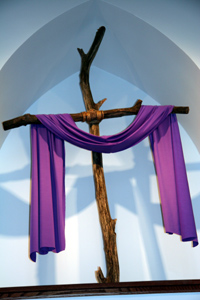
It’s funny how I still have the same recurring nightmares that I had as a child.
Going to school and suddenly realizing that I forgot to dress myself that morning.
Being chased in the darkness by a gang of clowns that included Bozo, the Town Clown from Captain Kangaroo and Ronald McDonald.
But perhaps my most frightening recurring nightmare is the one where, I suddenly find myself standing in my front yard that is crawling with snakes. I can’t take on step without stepping on a slithering serpent.
Our deep fear of snakes makes even more strange the reference that Jesus makes to an obscure story in the book of Numbers.
“And just as Moses lifted up the serpent in the wilderness, so must the Son of Man be lifted up that whosever believes in him might have eternal life.”
This reminds me of the Sumerian God of Healing who walked around with two intertwined snakes upon his staff, which was later adopted as the symbol for the American Medical Association.
It’s a strange image of healing, isn’t it? Two snakes on a staff. Something frightening and threatening as a symbol for healing and wholeness.
But anyone who has ever experienced surgery and has listened to the doctor discuss the risks involved, knows that if we want to be healed, sometimes we must take a risk. If we want to be made whole, sometimes our lives must be threatened.
Yet, we are often startled or frightened by any sight of a snake. And if we dream of snakes most of us would call that dream a nightmare.
The story in the book of Numbers begins as the starving Israelites desperately cry out to God for help. God hears their prayers and sends manna from heaven. At first, they were grateful, but after eating the manna day after day after day after day, they are fed up with it, literally and figuratively. So, in a spirit of selfish ungratefulness, they begin to complain God.
It is then that these “fiery” serpents show up.
One of my favorite preachers, Barbara Brown Taylor, points out that the Hebrew word for “fiery” is Seraph. She says that it is a word that is used to describe how your ankle feels when it is bitten by a poisonous snake: “fiery.” The serpents who bit the Hebrews for their ungratefulness were called Seraphs. Does that sound familiar? It is also the Hebrew name for angels.
In Isaiah 6, we are told that Seraphs or Seraphim surrounded the throne of God, protecting God. And here in Numbers, these, fiery, frightening Seraphs, these slithering serpents show up to frighten, hurt, but to ultimately save the people.
One could say that these fiery angelic serpents come to strike the people back into their senses. Being brought close to death, they remember how precious life is. They apologize to Moses, admitting how selfish and ungrateful they had become.
“Please, Moses, ask God to call back the snakes!” they pleaded.
However, God doesn’t remove the evil from their midst. Instead, God says to Moses: “take a brass serpent, put it on a pole, and make the people look at it.” So that in the future, when self-centeredness and ungratefulness overtake them, they will look at the snake, the symbol of their sinfulness upon the pole, and be saved.
Moses makes a replica of the outcome of the sin of the people and lifts it up onto a pole, makes them look at it, and there, they are able to see that the Seraph of death has become the Seraph of life.
In looking at the truth of who they were, no matter how painful and fiery that truth was—they receive salvation.
And now John says that Jesus uses this serpent on a pole to describe himself.
In a conversation with Nicodemus, Jesus uses the image of a snake on a pole as a parable of what he was doing to save the world. Thus, one could say that the Gospel of John refers to Jesus, not only as “the Good Shepherd,” but also as “the Good Snake.”
Jesus surprised us when he came to dwell among us, slithering into our darkness, our sinfulness. He opened his mouth and spoke prophetic words that cut us like a sword.
His teachings to love all people unconditionally, including our enemies, to sell our possessions and give them to the poor, to humble ourselves by taking the lowest seat at the table, to turn the other cheek, to forgive seventy times seven, to walk the extra mile, to regard women and children with equality, to welcome the foreigner, to do justice on the behalf of the marginalized, to defend the sinner, to see God in the least of those among us, to deny ourselves, lose ourselves and take up a cross, felt like a fiery poison coursing through our veins as it made us realize that we have a propensity to love the darkness more than the light.
So, we had him arrested, and when Pilate asked us to choose between an insurrectionist and Jesus, we chose the criminal. We tortured him and lifted him high on a pole. And while he was lifted up, his prophetic venomous words calling us to deny ourselves and take up our own crosses, somehow, some way became words of life.
And standing at the foot of this pole, all who, even today, hear him cry out, “Father, forgive them, for they know not what they do,” are able to look up and say, “Truly, this was the Son of God.”
When we dare to look intently at our Good Snake hanging on the cross, we begin to realize that on that cross hangs our refusal to follow his way of love, grace and justice, our choice to feed ourselves rather than feed hungry, look after ourselves rather than heal the sick, love ourselves, rather than love our enemies, and stand up for the rich, privileged and powerful rather than for those considered to be the least. We realize that on that cross hangs our pride, tribalism, hate, and bigotry. We realize that it was none other than our sin that put Jesus on the cross.
And it is in looking intently at the snake on the pole, we find our salvation. It is in looking at our propensity for evil in this world that saves us and enables us to build God’s kingdom of love, grace, and justice in this world.
This why we need to take notice when others try to prevent us from looking at our sins, acknowledging our evil past, and studying our blighted history. We need to wake up and pay attention when someone repeats a lie to re-write history constantly spouting misinformation such as: “The United States was founded as a Christian nation,” “the Civil War wasn’t over slavery,” “some slaves had it pretty good,” “the holocaust never happened,” or the January 6 insurrectionists were “ordinary tourists.” And we also need to take note how the cross on which Jesus was crucified by an always unholy marriage of religion and state has been made into an adored ornament, and how the cause of Jesus’ death is most often attributed to God’s love instead of the rejection of God’s love by sinful humanity.
There are forces in our world today that want us to forget our sinful history, because they know in the words of George Orwell, that “the most effective way to destroy people is to deny and obliterate their own understanding of their history.” But it is in remembering and studying the truth of our history, no matter how bad that truth hurts, even if it stings like fiery venom in our veins, that we become better, more loving, more gracious, more just, more like the D\disciples we are called to be.
There’s a reason that the Civil Rights movement was emboldened after Mamie Till, the mother of Emmett Till, forced us to look at the snake by declining an offer from the mortician to “touch up” her son’s body and opting for an open casket funeral, saying: “I think everybody needed to know what had happened to Emmett Till.”
Perhaps she knew that when we look intently at the snake, an outbreak of the Kingdom God can happen.
And as people who understand that it was our sins that put Jesus on the cross, we should always do everything we can to help others look at the snakes in our midst today: the bodies of school children riddled with bullets from a mass shooter; the bloodied face of a gay child beat by bullies in a middle school restroom; the malnourished, starved corpses of Palestinian children victimized by a war that needs to end. Because when we look intently at the snake, we find the courage to say: “enough is enough is enough already!”
In planning the annual Yom Ha Shoah Holocaust Remembrance service this week with Rabbi Harley and other clergy, we read together the following words written by Rev. Terry Dickinson which underscore our necessity to remember, to never forget, to always look intently at the snake, because if we are honest, we would rather look the other way and pretend it never happened:
I’d rather pretend it never happened.
I’d rather believe that the sky was never blackened by the smoke of human death, that children and mothers and innocent men
were never victims of such a magnitude of hate.I’d rather pretend it never happened, but if I have to remember,
if I must look into this gaping scar of human ignorance,
I want to believe that it could only happen once in the history of this universe. Yet, history has a terrible way of echoing in the stone-hard canyons of bigotry, repeating itself again and again.I’d rather pretend it never happened, for in remembering,
the world seems a frightening place,
where we cannot celebrate, but would rather exterminate our differences and merge into one large mass of sameness.I’d rather pretend it never happened and believe that it could never happen again. Yet, I know that as long as I look upon even one other person
with seeds of hate, and fail to see him as my brother,
or her as my sister, or them as my family,then my own precious soul is fertile ground
for these seeds to sprout yet another Holocaust.[i]
Let us look intently at the snake. Look at him, lifted up, crucified. Listen to his words of mercy, love and grace. For if we can keep our eyes on the snake upon the pole, one day, love will finally win, the kingdom will finally come, and the only place on earth we will be frightened is in the deep recesses of our darkest nightmares.
[i] By Rev. Terry Dickinson (1997, Christway Unity Church, Hot Springs, AR)









